Learn how to start a real estate business with crowdfunding in 2023. Discover the benefits of real estate crowdfunding, top crowdfunding platforms, and steps to launch your real estate business.
The global real estate crowdfunding market is expected to reach $868.9 billion by 2027.
That’s a huge opportunity for real estate entrepreneurs wishing to explore this funding option.
Real estate crowdfunding allows you to access lucrative real estate fund pools without having to directly handle the buying, managing, or selling of properties.
Want to Grow Your Real Estate Business? Download the Complete Grant & Funding eBook for instant access to grants, guides, and more. 80+ Grant and Scholarship Opportunities (FG, State-by-State, General & Underrepresented Groups Scholarships, Plus Grant Writing Checklist). 900+ Copies Sold Already. Get Your Copy Now
You can invest in different types of real estate projects, such as residential, commercial, industrial, or mixed-use, and earn passive income from rents, dividends, or capital gains.
In this article, you will learn how to start a real estate business in 2023 with crowdfunding.
We’ll walk you through why real estate crowdfunding is a great option, the top crowdfunding platforms to explore, and seven practical steps to launch and grow your real estate business with crowdfunding.
Let’s begin…
Real Estate Crowdfunding In 2023
Why Real Estate Crowdfunding Is a Game Changer In 2023
While the word ‘crowdfunding’ has been around for a while, real estate crowdfunding is a relatively new concept. It has been around since the early 2010s when platforms like RealtyMogul emerged and started to offer alternative ways of investing in real estate.
Since then it has gained more popularity and momentum.
A report by CrowdStreet showed that the pandemic of 2020 accelerated the adoption of online real estate investing by 10 years. More investors turned to online platforms to diversify their portfolios and access high-quality deals that were previously reserved for institutional investors.
On one hand, the situation increased the demand for certain types of properties, such as industrial warehouses, data centers, self-storage facilities, and multifamily housing. On the other hand, it made it harder for some entrepreneurs to secure financing from traditional sources like banks.
That’s when real estate crowdfunding became necessary.
This model offers several benefits for real estate entrepreneurs who want to start or grow their business in 2023:
- It lowers the barriers to entry: You don’t need a lot of capital, experience, or connections to start a real estate business with crowdfunding.
- It increases your exposure and credibility: You can showcase your projects to thousands of potential investors who are interested in your niche and location.
- It reduces your risk and liability: You share the ownership and profits with your investors, who are also your partners and supporters.
- It enables you to scale faster and easier: You can tap into multiple streams of capital from different platforms and investors.
Crowdfunding allows investors to invest in multiple properties without having to purchase or manage them themselves.
They do this by contributing money to a real estate group created by a developer, also known as a sponsor or operator. The developer is responsible for the day-to-day management of the property, so investors do not have to worry about it.
7 Practical Steps to Start and Grow Your Real Estate Business with Crowdfunding
Crowdfunding platforms have democratized the real estate market, making it more accessible to individual investors. If you’re considering entering the real estate business through crowdfunding, you’re in the right place.
Step 1: Platform Registration
You’ll want to do your research and select a platform that aligns with your investment goals and risk tolerance. Look for platforms with a solid track record and user-friendly interfaces.
Once you’ve chosen a platform, sign up by providing your personal information and financial details. You may also need to verify your identity, so have your identification documents ready.
In some regions, you may need to meet accreditation requirements to invest in certain projects. Make sure you understand these requirements and meet them if necessary.
Step 2. Project Selection
Now that you’re registered, it’s time to start exploring real estate projects available on the platform.
Browse through the platform’s listings to find various real estate opportunities. Each project will come with detailed information, including location, property type, financial projections, and developer background.
You may want to consider your investment goals and risk tolerance. Are you looking for steady income or long-term capital gains? When you’ve decided, choose projects that align with your strategy.
Step 3: Due Diligence
Before committing your hard-earned money, conduct thorough due diligence on the projects that pique your interest.
It’s good practice to scrutinize every detail provided about the project. This includes the property’s location, market analysis, and potential return on investment.
Also, identify and assess potential risks associated with the project. Consider factors like market volatility, regulatory changes, and economic conditions.
Step 4: Investment Commitment
Once you’re satisfied with your due diligence, it’s time to commit your investment but make sure you meet the platform’s minimum investment requirement for the project you’ve selected.
Review your investment details, including the amount you’re investing and the terms of the investment. Confirm your commitment
Step 5: Funding Period
Crowdfunding campaigns typically have a set funding period.
During this period, the project aims to secure the required capital from multiple investors. Be patient and monitor the campaign’s progress. If the project successfully reaches its funding goal, it moves to the execution phase:
The developers will take charge and start executing the planned real estate venture according to the project timeline.
Step 6: Monitoring and Updates
Throughout the project’s lifecycle, the crowdfunding platform and developers will provide you with regular updates and progress reports on the project’s status. Your investment model will determine how you earn from the project:
If you’re investing in equity, you may receive periodic income distributions. In debt-based investments, you might earn interest payments, and potential capital gains are possible upon project completion.
Step 7: Reinvesting and Growing Your Real Estate Business
Whether you’re looking to acquire new properties, improve existing ones, or expand your portfolio, the income generated from crowdfunding platforms can be reinvested strategically.
You can reinvest your earnings into new crowdfunding projects or other real estate opportunities. This can help you grow your real estate portfolio over time.
And if you’re managing properties as part of a real estate business, you can use it to expand your property management operations – whether you want to hire additional staff or invest in property management software to streamline operations.
7 Best Real Estate Crowdfunding Platforms for Real Estate Businesses
Now that you know how to start a real estate business with crowdfunding, you may be wondering which crowdfunding platforms are the best for real estate businesses in 2023.
Check out our top seven picks below!
1. RealtyMogul

RealtyMogul is one of the leading real estate crowdfunding platforms in the US.
It offers both equity and debt investments in various types of real estate projects across the country. Additionally, it offers private REITs that allow investors to diversify their portfolios with a low minimum investment of $5,000.
RealtyMogul has funded over $2 billion worth of real estate projects since its launch in 2013.
2. CrowdStreet
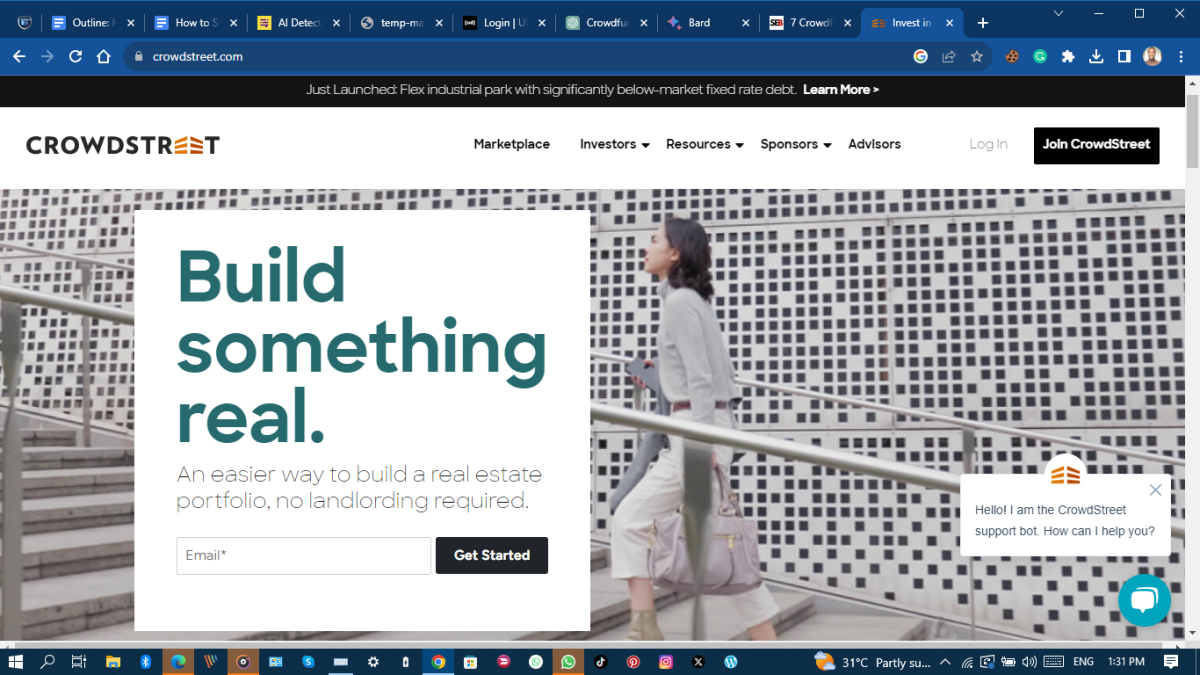
CrowdStreet is another prominent real estate crowdfunding platform in the US.
It specializes in equity investments in commercial real estate projects such as office buildings, retail centers, hotels, or multifamily housing. The platform also offers a private REIT that allows investors to invest in a diversified portfolio of institutional-grade properties with a minimum investment of $25,000.
CrowdStreet trails behind RealtyMogul with a total of over $1.7 billion worth of real estate projects funded till date.
3. EquityMultiple
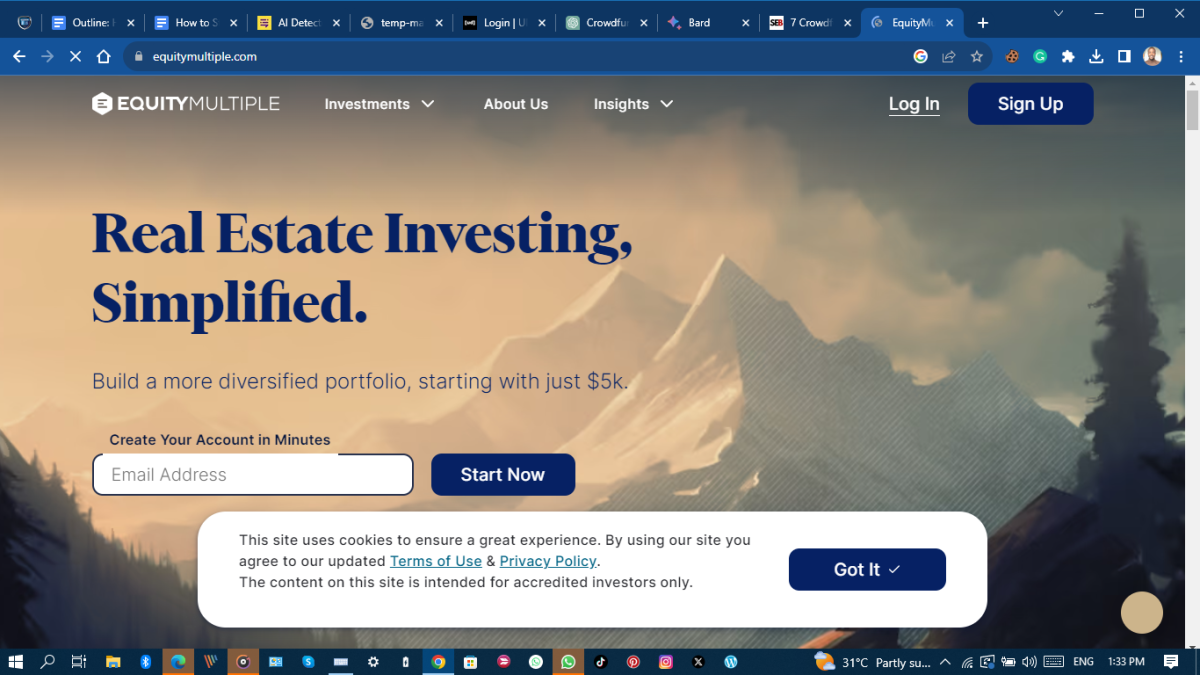
EquityMultiple’s key feature is its REIT, which grants investors the opportunity to diversify their portfolios by investing in a range of income-generating properties.
The minimum investment required to participate starts at $10,000. Since its establishment in 2016 this platform has successfully funded real estate projects exceeding a value of $1 billion.
4. RealtyShares
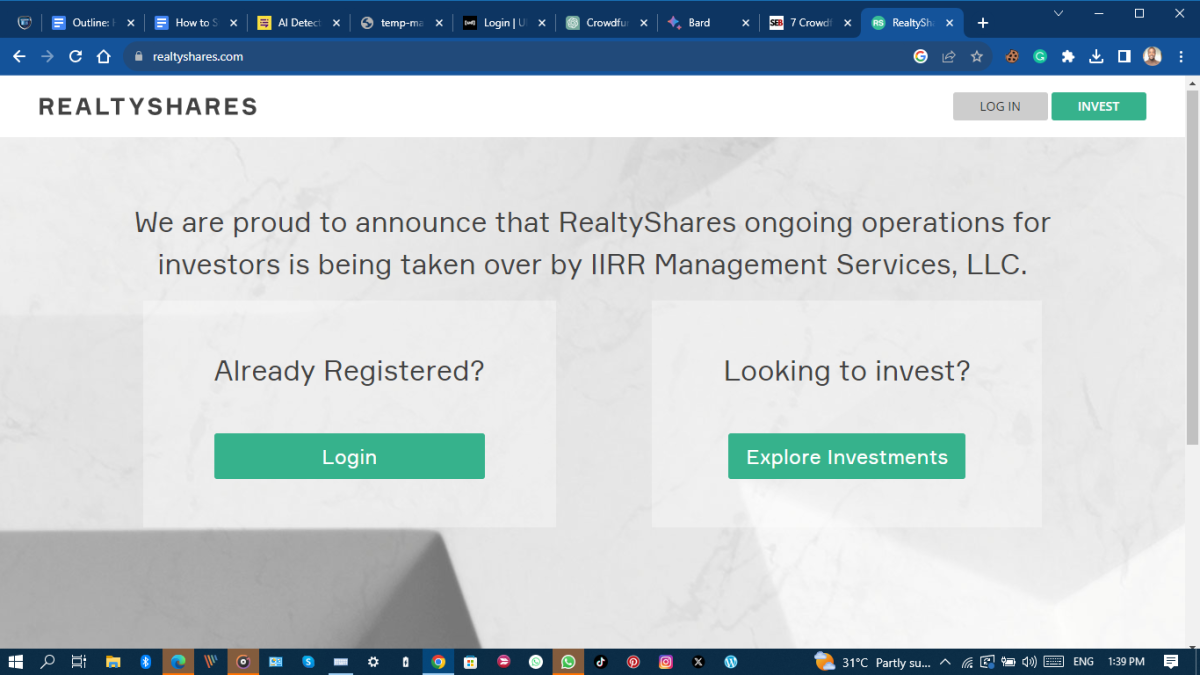
With over $900 million worth of real estate projects funded since its launch in 2013, RealtyShares is another formidable contender. It offers both equity and debt investments in residential and commercial real estate projects across the US.
Plus, with over 90 percent of its investments generating a positive return for investors, RealtyShares has a solid track record of success.
RealtyShares offers a variety of investment opportunities, including debt investments, equity investments, and preferred equity investments. Their minimum investment is $10,000.
5. Fundrise
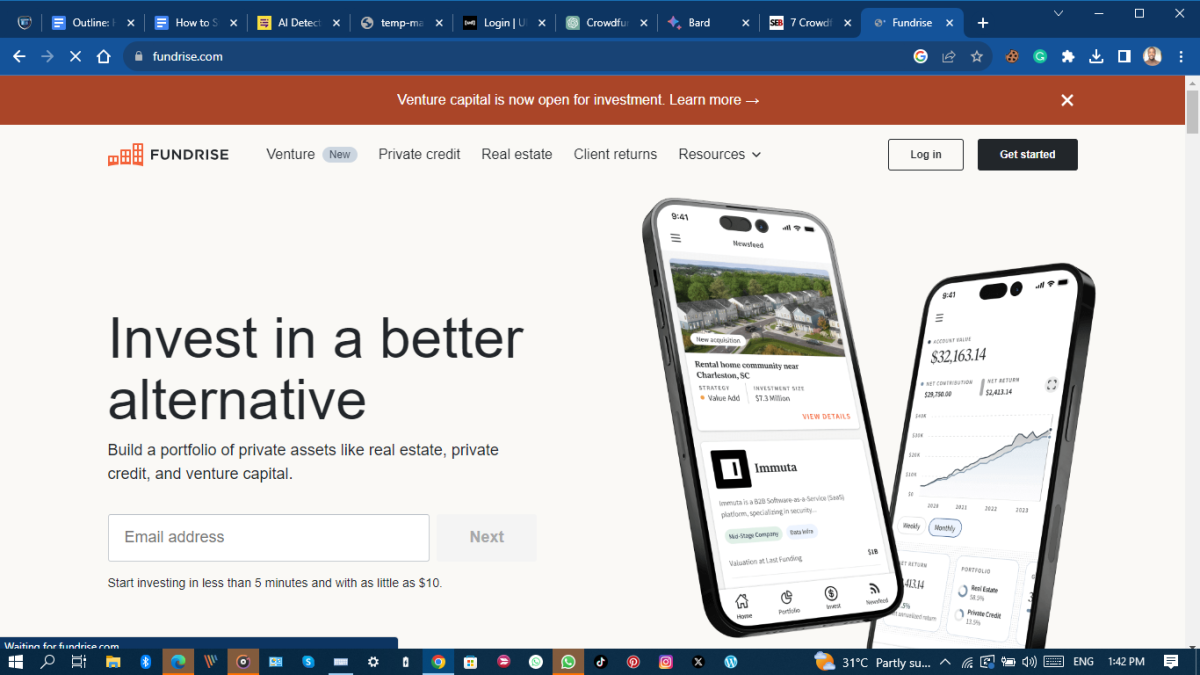
Fundrise allows investment options such as eREITs, eFunds, and direct investments.
This crowdfunding platform has over $3.3 billion in assets under management consisting of a diversified portfolio of residential and commercial properties across the US.
Fundrise has a low entry barrier with a minimum investment of $10.
It is ideal for real estate entrepreneurs who want to leverage the expertise and resources of Fundrise’s team to find and manage the best deals for their projects.
6. DiversyFund
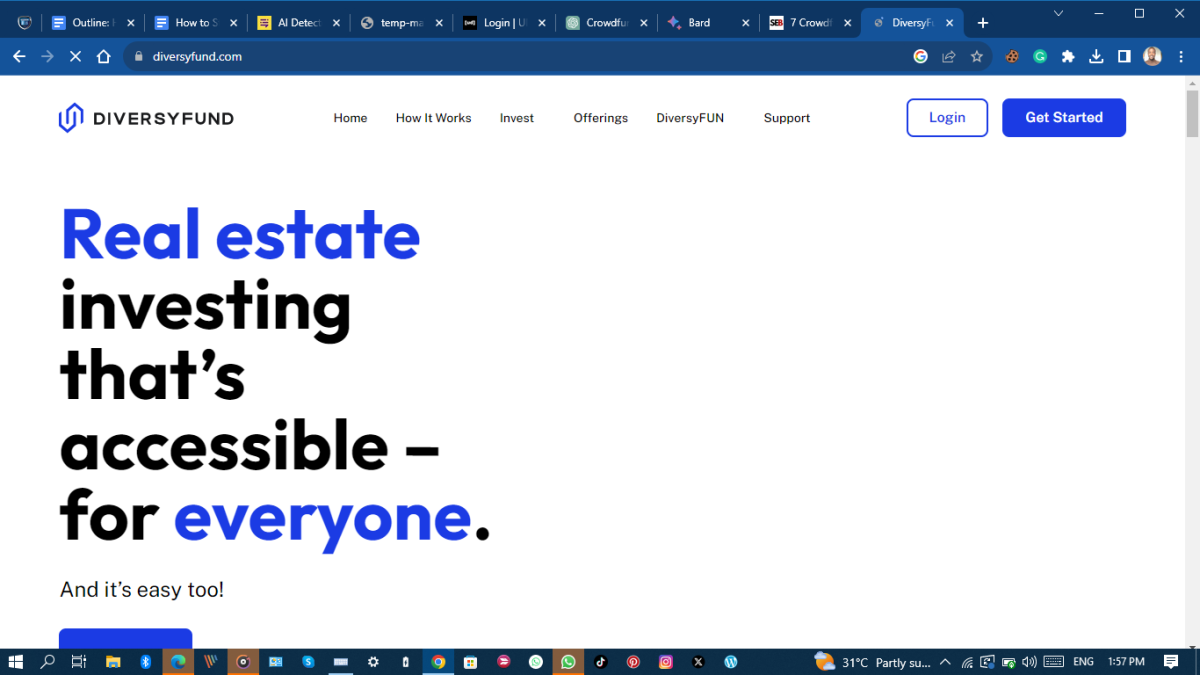
DiversyFund is a real estate crowdfunding platform that offers private REITs that allow investors to invest in a diversified portfolio of multifamily properties across the US.
The platform has an excellent track record, with over 90 percent of its investments generating a positive return for investors, and has raised over $100 million from investors.
They offer a single investment product, a private REIT, which invests in a diversified portfolio of commercial real estate assets. The minimum investment on DiversyFund is $500.
7. Yieldstreet
Yieldstreet is a real estate crowdfunding platform that offers debt investments in various types of real estate projects such as single-family homes, multifamily housing, office buildings, or hotels. It also offers other alternative investments such as art, marine, or legal finance.
Yieldstreet is ideal for real estate entrepreneurs who want to diversify their sources of funding and access investors who are looking for high-yield and low-risk deals.
The platform has funded over $100 million worth of real estate projects since its launch in 2015.
Real Estate Crowdfunding: Wrapping it Up
In this article, you have learned how to start a real estate business in 2023 with crowdfunding.
Now it’s time to launch out, find, and invest in a credible crowdfunding platform. If you get it right, you will have unlocked a steady stream of funds for your real estate business or next big project.
Hand-Picked For You:
- FAQs: How to Start a Business In 2023
- FAQs: How to Grow Your Business In 2023
- FAQs: How to Fund Your Business In 2023
- Top Small Business Challenges and How to Navigate Them
- How to Rank On the Google First Page
- Backlink SEO Strategy: How to Build Quality External Links
- How to Grow Your Business In 2023
- How We Made Six Figures In 21 Days Just Sending Emails
- Whatsapp Marketing for Small Businesses
- Top 21 Facebok Ads Retargeting Ideas
- 35 Low-Cost Online Business Ideas With High Profit
- Social Proof Marketing For Dentists (Small Businesses)
FAQs
Is Real Estate Crowdfunding a Good Investment?
Real estate crowdfunding is a good option for investing small sums and potentially receiving impressive returns. However, it inherently carries risks.
We advise against investing your life savings or a significant portion of your assets into real estate crowdfunding. Nonetheless, if you’re seeking a high-risk reward opportunity you might consider allocating a percentage of your investment portfolio towards it.
How Do Crowdfunding Platforms Differ from REITs?
Here are the major differences between the two investment types:
| REITs | Crowdfunding Platforms |
| REITs (real estate investment trusts) are companies that own and operate income-producing properties such as apartments, offices, malls, or hotels. | Crowdfunding platforms are websites that connect real estate entrepreneurs with investors who are willing to fund their projects in exchange for a share of the ownership, profits, or rewards. |
| They are traded on public stock exchanges like any other company. | They are not traded on public stock exchanges like REITs. |
| REITs are more liquid than crowdfunding platforms because they can be bought and sold easily on the stock market. | Crowdfunding platforms are less liquid because they usually have lock-up periods or minimum holding periods that prevent investors from selling their shares before a certain time. |
| REITs are more diversified than crowdfunding platforms because they own a large number of properties across different sectors and locations. | Crowdfunding platforms are less diversified because they usually focus on a smaller number of projects within a specific niche or location. |
What Is an Example of Crowdfunding in Real Estate?
An example of crowdfunding in real estate is Aka United Nations, a luxury extended-stay hotel in New York City that was funded by Prodigy Network.
The project involved renovating an existing building into a 95-unit hotel that offers spacious suites, modern amenities, and personalized services to guests who stay for 30 days or longer. The project cost $95 million, of which $12 million was raised from 116 investors through Prodigy Network.
The investors received an equity stake in the project and a share of the profits from the hotel operations. The project was completed in 2016 and has been operating successfully since then.
What Is the Disadvantage of Real Estate Crowdfunding?
Some of these risks and challenges of real estate crowdfunding are:
- Fraud: There is a possibility that some crowdfunding platforms or projects may be fraudulent or dishonest.
- Loss: Some may face unexpected problems or difficulties such as market downturns, legal disputes, environmental issues, or operational failures.
- Illiquidity: There is a possibility that some crowdfunding investments may long lock-up periods or minimum holding periods that prevent investors from exiting their investments before a certain time.
What Are the Best Real Estate Crowdfunding Platform for Non-accredited Investors?
If you’re non-accredited, don’t fret. The following crowdfunding platforms are great for non-accredited investors:
- RealtyMogul
- Yieldstreet
- EquityMultiple
- DiversyFund.
- Fundrise
This list is not exhaustive but these are the ones which we recommend. As always, it’s best to do your research and find the one that best suits your specific needs.

